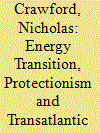| Srl | Item |
| 1 |
ID:
192143


|
|
|
|
|
| Summary/Abstract |
US President Joe Biden has worked to repair the damage done to the transatlantic relationship by his predecessor, quickly realigning the United States with Europe on issues of energy and climate change. However, the US Inflation Reduction Act (IRA) of 2022 introduced a raft of protectionist subsidies for US clean-energy industries and reignited tensions between the US and the European Union. The EU has warned that the IRA could damage the bloc’s industry and American critics suggest the act may trigger a new US–EU trade war. The Biden administration’s geopolitical internationalism is at odds with its geo-economic nationalism. The fact remains, however, that Europe is unlikely to be severely affected by the IRA. Moreover, European political leaders have threatened more aggressive responses to the IRA than they can deliver. A trade war is unlikely. It is more likely that booming green industries in the EU and US will open new avenues to cooperation between them.
|
|
|
|
|
|
|
|
|
|
|
|
|
|
|
|
| 2 |
ID:
187259


|
|
|
|
|
| Summary/Abstract |
Efforts to accelerate the energy transition are essential. But rising demand for renewables and constrained supply of low-carbon technologies and critical resources mean green investment costs are already on the rise. The phenomenon of greenflation will introduce new geopolitical risks and exacerbate risks already associated with the energy transition. In the West, populist movements may seize on greenflation to reject net-zero emissions goals, testing national and international coalitions. However, it is the world’s poorest states that can expect to be most adversely affected by greenflation and by wealthy states’ protectionist responses. Meanwhile, states rich in critical resources will gain new geopolitical prominence as major economies court them to boost supply. Ultimately, greenflation could undermine the principal remaining strand of cooperation between China and the West – their common interest in stemming climate change. Competition, rather than cooperation, looks like greenflation’s likeliest result.
|
|
|
|
|
|
|
|
|
|
|
|
|
|
|
|